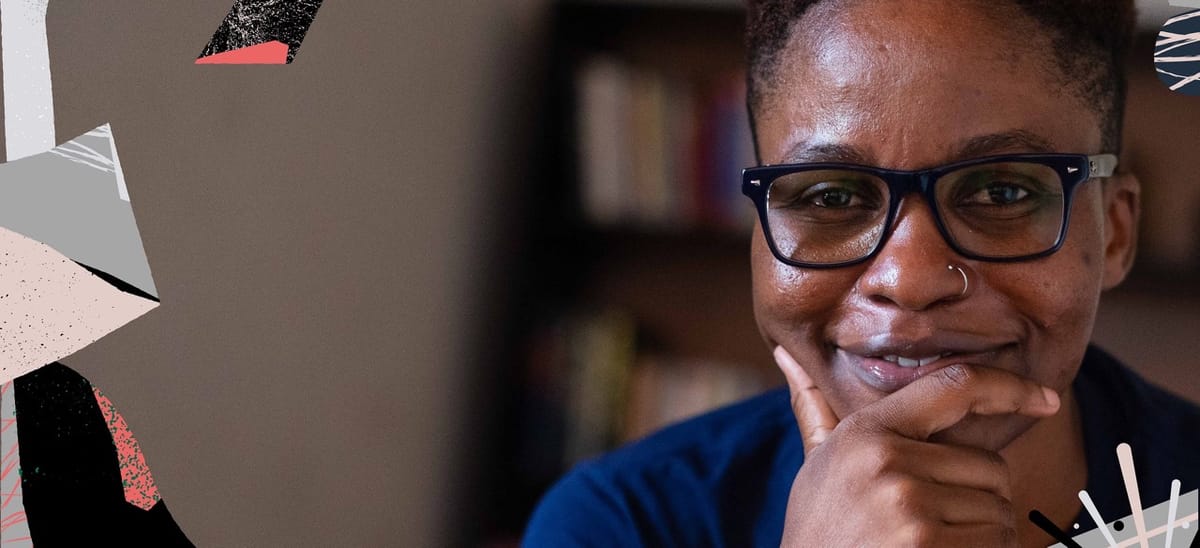My Coming Out: A Chat with Jo Maenzanise
Coming out stories are as diverse as people.

Access the Audio Read version of this article directly on Spotify for Podcasters.
"I worried about my safety because people are often driven to harm others simply because they cannot stand their existence."
This is the fourth instalment of My Coming Out, an interview series sharing the unique stories of people all over the world, who came out as lesbian, gay, bisexual, transgender, queer, intersex, asexual or questioning.
Coming out stories are as diverse as people. This series may inspire you, make you laugh or cry. They also offer guidance for effective allyship of the LGBTQIA+ community. We hope they help you and your loved ones.
This month we chat with Jo Maenzanise (they/them), a trans non-binary lover of coffee, comedy, and pitbulls' smiles. They are “their ancestors' wildly queer kid”. Jo’s writing has been published by Broadview, Metro UK, Pink News, Black Youth Project, Wear Your Voice Mag, etc. You can follow Jo and read their published work on Twitter here: @_JoMaenzanise
The Spill: Hi Jo, please tell us a bit about yourself
Jo Maenzanise: My government name is Joyline Maenzanise. I love it when people call me Jo because the name is gender-neutral and it affirms who I understand myself to be. I'm a 35-year-old trans non-binary Zimbabwean. My pronouns are they/them. I'm currently working as a freelance writer and editor. My main areas of interest are mental health, sexual health and reproductive rights, LGBT rights and experiences, and cultural criticism.
TS: So when did you ‘know’?
JM: In my late teens, I became aware of the unique way in which I seemed to admire some girls and women. At that time, I didn't think much of those feelings. I didn't even know they suggested anything about my sexual orientation. As I grew older, those feelings got more pronounced and harder to ignore or suppress. I was around 26 or 27 when it started becoming clear that I was attracted to women and there was a name for that.
I became aware of my sexual orientation before understanding my gender identity. The process of coming out to my family was one that essentially set me on course to understanding myself. When I was 33, I was aware of the ways in which I didn't fully feel like a woman and wasn't a man too. I also wasn't really looking to redefine what being a woman is or looks like. So, I began to search for words that best described how I felt. It’s 2021 now and I am a trans non-binary person.
TS: When did you come out, and why?
JM: I came out to my family in January 2014. One of the directors at my university asked me if I was really out if my own family weren't aware of my sexual orientation. This was during a chat about my queerness and plans to start an LGBT+ club at the university. Her question challenged me to take that move which I had thought of but was really scared of taking. I know that our Christian upbringing would somehow influence how my identity was received. I decided to come out, not so much because I was pushed to do that, but I felt like I had this huge burden that I needed to let go off. I didn't want to live a "double life." I also wanted my family to know that if I ever talked of relationships, it would definitely not be with men. I also needed them to know that they probably didn't need to expect any bride price from me.
After coming out to my family, I no longer feel the need to come out. So I didn't come out as trans. I simply updated my social accounts. I am now letting people in. I am simply living my truth and people will just receive me as I freely express myself.
TS: How did you do it?
JM: We were all living in different countries. So I only had to send an email. It was hard finding the words. While I may have wanted to let them know that I am queer, I didn't want to shove it down their throats. I also didn't want to seem as if I sought their approval. A mate from university who was openly lesbian and fortunate to have been easily accepted by her family helped me with some coming-out-tips. I applied those and hit that send button. Sending the email wasn't easy and waiting for the responses and seeing them come in was just as hard. Thankfully, one of my lecturers offered to be there with me when I went through the responses from my family.
TS: Did you come out once or several times?
JM: Before coming out to my family, I came out to a few other people from my university. It was harder for me to come out to my close friend though. I was afraid of possibly losing a good friendship that had been helping me a lot, academically and emotionally.
TS: How did people react when you came out?
JM: The reactions were varied. Some were accepting. Others would tell me they were OK with my queerness as long as I didn't make a move on them. Or they would tell me that they don't judge me because the Bible says not to judge even if it doesn't condone homosexuality. I've had videos of ex-lesbians who found Jesus - and a husband - sent to me by a relative. I've been sent long emails containing verses that condemn homosexuality. I've even told to find a pastor to pray for me and to stay away from gay people. But being accepted by those who did trumped all the noise from those who may just need to deal with their damaging beliefs about people like me.
TS: What were your fears or concerns before/when you came out?
JM: I was worried about losing friendships and relationships. And I worried about my safety because people are often driven to harm others simply because they cannot stand their existence.
TS: Do you have any frustrations or concerns about your community that you would like to address?
JM: I mainly worry about the ways in which we structure our relationships using cisheteronormative standards. We seem to be obsessed with rules and want to dictate how others navigate their queerness based on how they dress or express their gender. Also, there is biphobia, transphobia, and so many other issues that really make one wonder if we truly are a "community" that wants everyone to live and let live.
TS: How did coming out affect your life?
JM: It freed me to learn more about myself and define myself without being tied down by societal and familial norms. It gave me the power to openly embrace my queerness and to face and challenge queerphobes in the rest of society. I am aware of the risks, but coming out liberated me.
TS: Are you out in all aspects of your life?
JM: Yes. I am pretty damn visibly queer.
TS: What are you the most grateful for now that you’ve come out, and about your community?
JM: I am grateful that I don't date men. Seriously. I have seen how many women endure a lot of pain in patriarchal, heterosexual marriages. This isn't to say marrying a woman, for example, means that marriage will be rosy. I am just grateful that queerness gives me an opportunity to build safer relationships where one party won't necessarily feel emasculated by the equal distribution of power. I know some men "get it”, but I'm good. Also, looking at who I am now, I highly doubt a man could handle my power.
TS: Do you have any regrets about how you came out?
JM: Not at all. I know some say coming out is unnecessary because cisheterosexual folks don't do it. But, I am glad I did.
TS: What would you tell your younger self, before you came out? Is there anything you wish you had known?
JM: When you are ready, let people in. Don't do it because you feel pressured by someone who may not even be there to help you deal with the consequences of disclosing that part of your identity.
TS: What advice would you give people going through this, whether they are scared of coming out, going through this alone, or unsure of how to do it?
JM: It is important to understand why you want others, loved ones, to know you are gay, lesbian, etc. It is important to see if you are in a position to accept their reactions, knowing fully well some have been rejected because of this. If you don't feel ready, don't do it. Safety first! If you don't feel ready, but still want to knock that closet door down, why not.
TS: What are you the most proud of about your coming out, and in your life in general?
JM: I found my voice. I have also been quite vocal about LGBT+ rights in Zimbabwe.
TS: If you could, what would you like to change to make this a better experience for people? And to improve life for the LGBTQIA+ community?
JM: Zimbabwe continues to uphold anti-gay laws that foment a climate of intolerance that has seen people like me endure a lot of violence, with no recourse to justice. Those laws need to go. Society's attitude towards queer people also needs to change. Still, with constitutional protection, queer people will be able to lay charges against those who believe they can harm others with impunity.
TS: What advice would you give to people for them to be a supportive and effective ally when a loved one is coming out to them?
JM: I believe allies shouldn't even wait for someone to come out before they can express their support. Allies should wear their beliefs about queerness on the sleeve so that if a family member is queer, they already are assured that they have one person in their corner.
TS: What should people NOT do when someone comes out to them?
JM: How about they stop being intolerant?
TS: Are there any resources, organisations, websites or any content you would like to share, that helped you personally or could help others?
JM: Sharing online spaces with several queer folks from different parts of the world has been an immense help. Their intellect, the ways in which they embraced their identities and shared their experiences was really empowering and it surely played a part in who I have become, and am still to become. We may have areas to individually and collectively work on, but sharing spaces with other queer folks has its advantages.
TS: What are your hopes for the future, or projects that are meaningful to you?
JM: I would like to start a project meant to empower underprivileged queer folks living in Zimbabwe. I would also want to open a shelter for queer folks who may need accommodation, especially those living with intolerant families.
TS: Is there anything else you would like to add, and share with the rest of the world?
JM: I am enjoying being queer. Queerphobia and all...
Would you like to share your coming out story with us? Contact us at team@thespillmag.com.





